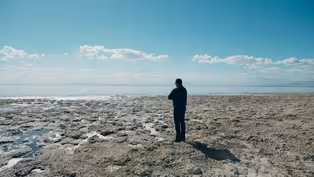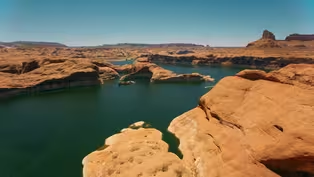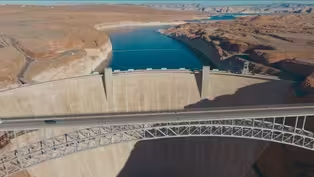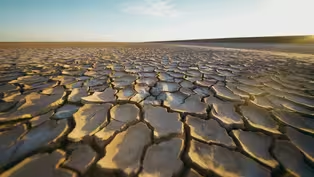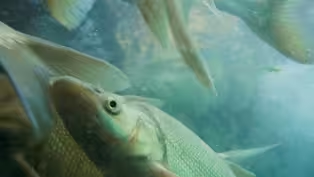
Vegas vs. the Desert: Plumbing the Impossible
Clip: Season 2 Episode 5 | 11m 19sVideo has Closed Captions
Las Vegas defies the desert with epic engineering — but at what long-term cost?
Las Vegas thrives in one of the driest places on Earth thanks to engineering feats and strict water laws. Shane meets Colby Pellegrino and Cameron Donnarumma of the Southern Nevada Water Authority and visits the world’s oldest hydraulic dam in Italy with Giulio Boccaletti to explore what it takes — and what it costs — to bend water to human will.
Problems playing video? | Closed Captioning Feedback
Problems playing video? | Closed Captioning Feedback

Vegas vs. the Desert: Plumbing the Impossible
Clip: Season 2 Episode 5 | 11m 19sVideo has Closed Captions
Las Vegas thrives in one of the driest places on Earth thanks to engineering feats and strict water laws. Shane meets Colby Pellegrino and Cameron Donnarumma of the Southern Nevada Water Authority and visits the world’s oldest hydraulic dam in Italy with Giulio Boccaletti to explore what it takes — and what it costs — to bend water to human will.
Problems playing video? | Closed Captioning Feedback
How to Watch Human Footprint
Human Footprint is available to stream on pbs.org and the free PBS App, available on iPhone, Apple TV, Android TV, Android smartphones, Amazon Fire TV, Amazon Fire Tablet, Roku, Samsung Smart TV, and Vizio.
Buy Now

Surprising Moments from Human Footprint
Do you think you know what it means to be human? In Human Footprint, Biologist Shane Campbell-Staton asks us all to think again. As he discovers, the story of our impact on the world around us is more complicated — and much more surprising — than you might realize.Providing Support for PBS.org
Learn Moreabout PBS online sponsorship(engine humming) (Shane) Comedian Jason Love joked, "Las Vegas has all the amenities of modern society, in a habitat unfit to grow a tomato."
(water droplet plops) (water rushing) (hip-hop music) ♪ (whooshing) (energetic music) ♪ (casino machine clattering) It’s a glittering oasis of extravagance where visitors can lose themselves in an alternate world of luxury and fantasy while ignoring the harsh reality.
(casino games beeping) (button clicks) (eerie music) (Colby) We get 90 days above a hundred degrees.
We are the driest metropolitan city in the United States.
We get less rain than any other metropolitan city by almost half.
(horse whinnies) (mellow music) (Shane) Meet Colby Pellegrino of the Southern Nevada Water Authority.
She’s been riding horses around this parched city her entire life.
♪ (horse knickers) ♪ If you ask Colby, the most valuable thing in Vegas isn’t locked up in a casino vault.
(Colby) This is the electrical control room that helps operate and supply the energy that that little pump needs to fill our valley with water.
(hip-hop music) (Shane) The pump station is like Oz’s man behind the curtain.
It’s the invisible linchpin of an intricate system that makes Las Vegas possible.
(Colby) This pump station has 34 pumps in it.
Just to give you an idea of the magnitude, one of those pumps could fill an average residential swimming pool in 20 seconds.
-(girl screams) -(water splashes) (Shane) The pumps move water from the Colorado River to two treatment plants that can each deliver 900 million gallons a day to the valley’s homes and businesses.
(soft music) (Colby) If you were to sort of peel up the streets and the sidewalks, there’s water infrastructure everywhere.
Larger pipes that feed major areas, and then as you branch off they get smaller and smaller and smaller, so that when you turn on the tap, it’s there.
You could not inhabit the Las Vegas Valley without the water infrastructure that we have.
♪ (Shane) But the engineering that makes life in Las Vegas possible is part of a tradition that started a long time ago... (whooshing) ...on a continent far, far away.
(whooshing) (bells chiming) (hip-hop music) (whooshing) ♪ (water flowing) (Giulio) If you walk around Bologna, it’s a reminder of how powerful the engineering of water can be for urbanization.
♪ (ocarina music) (Shane) Meet Giulio Boccaletti, whose virtuosity on the ocarina has made him something of a celebrity in Japan.
♪ He’s also a geophysicist, whose recent book explores humanity’s relationship with the world’s most important molecule.
(water rushing) (Giulio) Water is the primary agent that transforms the landscape around us.
(slow, suspenseful music) Water can cut through mountains or transform floodplains, can wash away cities.
Water can change your life in a day.
♪ So it’s a really powerful thing that we need and we fear.
Once we start converting natural ecosystems into ecosystems that are functional to our life, we have to master water.
We have to domesticate water in order to bring it to where we need it.
♪ (Shane) So why did you want to have this conversation in this place specifically?
Well, this is an important place.
The oldest mason-built hydraulic infrastructure in Europe.
(tranquil music) (Shane) The Casalecchio dam re-routed water from the Reno River to generate hydropower miles away, launching a process of early industrialization that made Bologna the wealthiest city in Europe for nearly 300 years.
♪ (Giulio) Everything that you could mechanize was done with water.
And this, in the 1300s, was like discovering oil, right?
It completely transformed the economy.
(machinery clattering) And so, in a way, it changed the world, right?
Because it was the first industrializations all powered by water.
But more importantly, it changed institutions.
(soft, tense music) (Shane) As Giulio sees it, no one person can tame a force as potent as water.
We have to come together.
And exactly how we do that, and for whose benefit, reveals a lot about what we value.
♪ (Giulio) The visible marker of it is, of course, the infrastructure we build, but the real ingredient is institutions that we construct in order to manage this on our behalf.
(Shane) The institutions Guilio’s talking about are the bedrock of our society, the governments, laws, and social structures that determine how we harness and distribute a precious resource.
(mellow music) Whether that’s in 14th-century Bologna or 21st-century Nevada.
(announcer) Casinos, hotels, good food, and entertainment.
And don’t worry, there’s always tomorrow.
(Colby) Las Vegas is originally formed because there were springs.
Las Vegas means "the meadows."
♪ As the community grew, the spring started to dry up.
So we saw more and more wells.
Those wells began depleting the aquifer at a rapid rate until we tapped into the Colorado River in the late ’70s.
♪ (soft music) (Shane) From headwaters in the Rocky Mountains, the Colorado River travels 1,450 miles through seven states, then into Mexico, before finding its equilibrium in the Gulf of California.
(narrator) The river had to be regulated.
No more floods, no more droughts.
♪ (Colby) Nevada has the smallest allocation of Colorado River water.
We’re actually allocated 1.8% of the available resources on the Colorado River.
♪ (Shane) But that water allowance was enough, at least at first, to support a booming population.
♪ (Colby) When I was born, there were 300,000 people that lived here.
There’s 2.3 million now.
Wow!
As the city has grown, so has its thirst.
But even in the "City of Sin," there’s one vice you can’t indulge... -(sprinkler sprays) -(woman sighs softly) ...wasting water.
(siren wailing) (energetic music) ♪ (water spraying) (Cameron) People want to have these beautiful lush green lawns, they want to feel like the American dream, but here in Las Vegas, we have a limited water supply.
(mellow music) (Shane) This is Cameron Donnarumma.
His official title is "Wastewater Investigator," but ’round these parts, he’s what’s known as a "Water Cop."
(Cameron) When we come across a water waste violation occurring, I’ll get out of the vehicle, I’ll go ahead and document that on video.
If they have no previous history, it’ll be considered a warning.
However, if we see the water waste violation is still occurring, a fine starts at $80.
If we come back and the violation is still occurring, it will double to $160 and so on.
♪ (Shane) In the most extreme case, is there like prison time that’s associated with it?
No prison time involved.
But we do have educational visits.
(Shane) Most of that education focuses on landscaping that can thrive here in the desert.
(mysterious music) (Colby) There is absolutely nothing that grows in the Mojave desert without irrigation.
(sprinkler spraying) So the number one consumptive use, by and large, is outdoor irrigation.
(water spraying) (Shane) The problem isn’t just that people want green lawns in a desert.
♪ It’s also that outdoor irrigation can’t be recycled.
(Cameron) So anytime you turn your sink or shower on, generally that water will be recycled and we can reuse it again.
Outdoor water use is a one-time use.
(water spraying) Once it goes out into the gutter, it evaporates, we can never see it again.
(water trickling) (Shane) Las Vegas, by necessity, is on the cutting edge of urban water efficiency.
(tranquil music) In the last 20 years, they’ve limited pool and fountain sizes, forbidden evaporative cooling systems, restricted car washing, and built infrastructure that recycles nearly 100% of the water used indoors.
♪ They’ve also incentivized the removal of over 200 million square feet of turfgrass, saving roughly 10% of their Colorado River allocation.
(Colby) This last year, 2023, we used the same amount of water we did in 1992, despite doubling our population during that time.
(Shane) But the Colorado River, like many around the world, is struggling to meet the needs of its other users.
(Colby) There’s over 40 million people that rely on the Colorado River.
(Shane) And while Western cities jockey for Colorado River water, the straws they’re sipping from are nothing compared to the big straw that gulps down almost 80% of the river’s flow... (somber music) Agriculture.
(sprinklers spraying) And even as our demands grow, the supply is dwindling.
(Colby) All of the predictions are that the Colorado River’s flow is going to decrease throughout time.
(Shane) We built farms, cities, and lives in a desert.
And to make it all possible, we used our species’ transformative powers to re-engineer a river.
(Giulio) So, in the span of a hundred years, we’ve basically transformed the hydrology of the entire planet.
(whooshing) We’ve converted hydrology, which is the natural way in which water manifests itself, into hydraulics to support modernization and industrialization.
(eerie music) So, I’d say, by now, we are the plumbers of the planet.
(whooshing) With that power comes the responsibility of deciding what to do with it.
(sprinkler spraying) (Shane) And the way we choose to flex that power can rewrite the stories of people, cultures, and ecosystems.
(Giulio) We imagine our future and author it, that’s an extraordinary trait, but we also sometimes imagine futures that become impossible to sustain.
The Beach Boys Played Here. Now It’s a Toxic Dust Bowl.
Video has Closed Captions
Clip: S2 Ep5 | 5m 13s | Toxic dust, dead fish, and vanishing water — what happened to California’s inland sea? (5m 13s)
The Dam Truth: What Glen Canyon Tells Us About a Drying West
Video has Closed Captions
Clip: S2 Ep5 | 9m | The Glen Canyon Dam promised water and power — but the river had other plans. (9m)
Video has Closed Captions
Preview: S2 Ep5 | 30s | A journey down the Colorado River reveals the ripple effects of humanity’s quest to conquer water. (30s)
Reviving the River: Hope Returns to the Colorado Delta
Video has Closed Captions
Clip: S2 Ep5 | 4m 59s | Aída Navarro joins the fight to revive the Colorado River Delta — and hope is flowing again. (4m 59s)
Tag, You're It: Tracking the Grand Canyon's Toughest Fish
Video has Closed Captions
Clip: S2 Ep5 | 4m 35s | USGS biologists tag humpback chub to monitor life in a changing Grand Canyon river. (4m 35s)
Providing Support for PBS.org
Learn Moreabout PBS online sponsorship
- Science and Nature

Explore scientific discoveries on television's most acclaimed science documentary series.

- Science and Nature

Capturing the splendor of the natural world, from the African plains to the Antarctic ice.












Support for PBS provided by:
